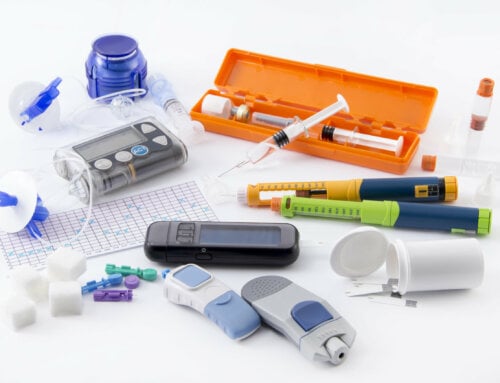Diabetes can lead to many other health conditions, yet few people recognize the connection between hearing loss and diabetes. Discover more about hearing loss and diabetes and what you can do about it.
- Diabetes has an effect on your body’s nerves which leads to conditions such as vision problems, neuropathy and kidney disease. Researchers are discovering this can also relate to the nerves in your ears. Recent studies have shown that people with diabetes that have good control, with an A1C of less than 7 percent, have better hearing. Proper diabetes self-management can have a positive impact on almost every part of your body including your ears. Keep adequate diabetes supplies on hand to regularly monitor your blood sugar levels.
Hearing loss can occur gradually which makes it difficult to notice. If you are always asking people to repeat themselves or you have trouble focusing on conversations in noisy places, you could be experiencing hearing loss. Another sign of hearing loss is constantly turning up the television or radio, especially if others complain it is too loud. Coping strategies might include lip reading, interpreting body language or making assumptions about what people are saying. Faking your ability to hear is a poor choice, as you are putting off getting necessary medical attention. There are medical ways to adapt to minor hearing loss. Hearing aids are available for more advanced hearing issues. With advanced technology, hearing aids can be small and undetectable to anyone other than you.
- There are several types of hearing loss. It is essential to maintain good blood glucose control as well as good blood pressure control to help avoid hearing loss. Age related hearing loss occurs gradually over time. However, research has shown people under 60 with diabetes are more prone to hearing problems than those who are over 60. If you experience hearing loss, visit an otolaryngologist, known as an ears, nose and throat specialist. An audiologist or hearing specialist should be added to your yearly screenings. People under 50 should have a screening every 2 years and over 50, every year. Some medicines can help people recover or improve their hearing, if they are administered right away.
- Prevention is the wisest way to ward off hearing loss and other health issues. Stick to your diabetes self-management plan and talk to your health care team to make changes as needed. Maintain proper blood sugar control through regular exercise, a healthy diet and taking medications as prescribed. Try to keep your A1C under 7 percent to prevent hearing loss. Protect your ears with ear plugs if necessary such as during loud concerts or when using loud machinery. The highest noise level people can tolerate is around 85 decibels.
- Hearing loss can lead to other conditions, such as lack of physical activity and depression which can ultimately lead to heart disease. Simple evaluation may get you back on track without a problem. Nearly half of people with diabetes have some type of hearing loss as opposed to 20 percent of people who do not have diabetes.
- Certain blood pressure medications may make you prone to hearing loss. There is a connection between blood-pressure lowering diuretics and hearing loss. Discuss your current medications with your health care team and whether they could contribute to future hearing loss.
Knowing the connection between diabetes and hearing loss can help you prevent or stall hearing problems. Be aware of the signs of hearing loss and seek immediate medical attention. Schedule regular hearing screenings with an audiologist as early detection can make a big difference.

 Hearing loss can occur gradually which makes it difficult to notice. If you are always asking people to repeat themselves or you have trouble focusing on conversations in noisy places, you could be experiencing hearing loss. Another sign of hearing loss is constantly turning up the television or radio, especially if others complain it is too loud. Coping strategies might include lip reading, interpreting body language or making assumptions about what people are saying. Faking your ability to hear is a poor choice, as you are putting off getting necessary medical attention. There are medical ways to adapt to minor hearing loss. Hearing aids are available for more advanced hearing issues. With advanced technology, hearing aids can be small and undetectable to anyone other than you.
Hearing loss can occur gradually which makes it difficult to notice. If you are always asking people to repeat themselves or you have trouble focusing on conversations in noisy places, you could be experiencing hearing loss. Another sign of hearing loss is constantly turning up the television or radio, especially if others complain it is too loud. Coping strategies might include lip reading, interpreting body language or making assumptions about what people are saying. Faking your ability to hear is a poor choice, as you are putting off getting necessary medical attention. There are medical ways to adapt to minor hearing loss. Hearing aids are available for more advanced hearing issues. With advanced technology, hearing aids can be small and undetectable to anyone other than you.





Leave A Comment